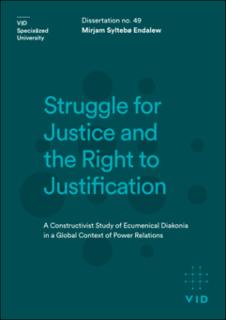| dc.contributor.author | Endalew, Mirjam Syltebø | |
| dc.date.accessioned | 2023-09-12T13:53:13Z | |
| dc.date.available | 2023-09-12T13:53:13Z | |
| dc.date.issued | 2023 | |
| dc.identifier.isbn | 978-82-8456-044-1 | |
| dc.identifier.uri | https://hdl.handle.net/11250/3088925 | |
| dc.description | Dissertation Submitted in Partial Fulfilment of the Requirements for the Degree of Philosophiae Doctor (Ph.D), VID Specialized University, Centre of Mission and Global Studies, Stavanger 2023 | en_US |
| dc.description.abstract | Ecumenical diakonia is a concept that churches use in descriptions of, and discussions about, their social ministries. Recent publications describe ecumenical diakonia as a struggle for justice with reference to systematic theological reflections. The purpose of this study is to contribute to the understanding of ecumenical diakonia as a struggle for justice based on empirical study of a case of ecumenical diakonia. The study asks: How is ecumenical diakonia a struggle for justice? The theoretical framework of the study is Rainer Forst’s critical theory of justice as the right to justification in dialogue with Achille Mbembe’s critique of Black reason and Athena Athanasiou and Judith Butler’s discussion about the power of recognition. The right to justification is a constructivist theory of justice that recognises that concepts and their meanings, including the concept of justice, are constructed in social processes. While Forst constructs a normative idea of what justice could look like in a just world, Mbembe provides a critical description of the unjust realities in the real world. The findings of the study are presented as a thick description developed based on participant observation of a case of ecumenical diakonia and interviews with actors predominantly from Africa and Madagascar. The study describes how power relations condition ecumenical diakonia and participate in the reproduction of injustice. The study identifies two kinds of ecumenical diakonia. The first kind of ecumenical diakonia is the kind of ecumenical diakonia where theologians and development donors construct norms and social orders for how actors should think and act. The second kind of ecumenical diakonia is the kind of ecumenical diakonia where actors themselves construct their own norms and social orders. Both these kinds of ecumenical diakonia are part of a complex system of power relations where economic inequalities reproduce unjust social and normative orders. | en_US |
| dc.description.abstract | Økumenisk diakoni er et begrep kirker bruker i beskrivelser av og diskusjoner om de sosiale tjenestene sine. Nyere publikasjoner beskriver økumenisk diakoni som kamp for rettferdighet med henvisning til systematisk teologiske refleksjoner. Formålet med dette studiet er å bidra til forståelsen av økumenisk diakoni som kamp for rettferdighet på grunnlag av en empirisk case-studie av økumenisk diakoni. Problemstillingen spør: Hvordan er økumenisk diakoni kamp for rettferdighet? Det teoretiske rammeverket i studiet er Rainer Forst sin kritiske teori om rettferdighet som retten til rettferdiggjørelse i dialog med Achille Mbembe’s kritkk av Svart fornuft og Athena Athanasiou og Judith Butler’s samtale om makten i anerkjennelse eller bekreftelse. Retten til rettferdiggjørelse bygger på en konstruktivistisk kunnskapsforståelse som anerkjenner at begreper og begrepers innhold, inkludert rettferdighetsbegrepet, blir til gjennom sosiale prosesser. Mens Forst konstruerer en normativ ide om hva rettferdighet kunne bety i en rettferdig verden, beskriver Mbembe konsekvensene av urettferdigheten i den virkelige verden. Funnene presenteres som en fyldig beskrivelse av økumenisk diakoni basert på deltakende observasjon av et tilfelle av økumenisk diakoni og intervjuer med aktører, hovedsakelig fra Afrika og Madagaskar. Studiet beskriver hvordan økumenisk diakoni betinges av maktforhold som bidrar til å reprodusere urettferdighet. Studiet identifiserer to typer økumenisk diakoni. Den første typen økumenisk diakoni er den typen økumenisk diakoni hvor teologer og bistandsdonorer konstruerer normer og sosiale ordninger for hvordan aktører skal tenke og handle. Den andre typen økumenisk diakoni er den typen økumenisk diakoni hvor aktørene selv konstruerer sine egne normer og sosiale ordninger. Begge disse typene økumenisk diakoni er en del av komplekse maktforhold hvor økonomisk ulikhet bidrar til å reprodusere urettferdige normer og sosiale ordninger. | en_US |
| dc.language.iso | eng | en_US |
| dc.publisher | VID vitenskapelige høgskole, Stavanger | en_US |
| dc.relation.ispartofseries | Dissertation Series for the Degree of Philosophiae Doctor (Ph.D.) at VID Specialized University;49 | |
| dc.title | Struggle for justice and the right to justification : a constructivist study of ecumenical diakonia in a global context of power relations | en_US |
| dc.type | Doctoral thesis | en_US |
| dc.description.version | submittedVersion | en_US |
| dc.rights.holder | All rights reserved. No part of this publication may be reproduced or transmitted, in any form or by any means, without permission | en_US |
| dc.subject.nsi | VDP::Humaniora: 000::Teologi og religionsvitenskap: 150 | en_US |
| dc.source.pagenumber | 169 | en_US |
